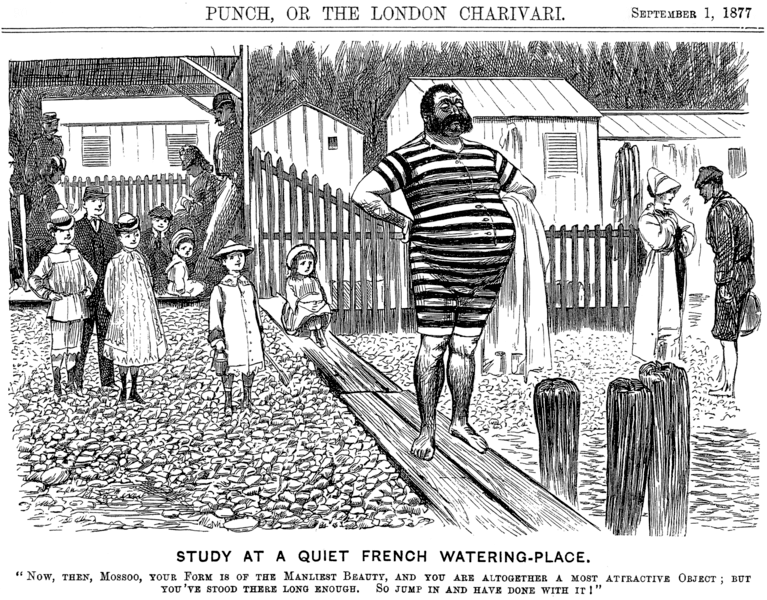Just downloaded the beta version of English V3.31, and I have to say I am very excited about it. This is definitely going to be a feather in the cap of Anglophones everywhere, and way better than the notorious V2.99 release of French (or the ‘deux point neufty-
Known as the ‘snowclone’ in some commercial implementations, this feature is an old friend to any journalists among you. Initially devised as an effortless method of generating magazine headlines and blog article titles, it has now been generally adopted as a way of churning out a thixotropic literary substance that partially-
The form is quite simple. Take a familiar phrase
x is the new black
which can be easily varied as required: ‘pink is the new black’, ‘iPhone is the new black’ &c. But note this is in fact an example of a curried1 parameterised cliché: the base phrase
x is the new y
can be parameterised with y set to a different value: ‘sex is the new golf’.
The maximum arity2 currently supported by the 3.31 implementation of parameterised clichés is four (trivial pronoun and article variations don’t count), for example Peter Greenaway’s
The w, the x, his y & her z 3
which can be instantiated to make headlines such as ‘The Footballer, the Housemate, The Sun & his Super Injunction’. Attempts to construct a 5-arity example based Dave Dee, Dozy, Beaky, Mick & Tich or a 6-arity from Pugh, Pugh, Barney McGrew, Cuthbert, Dibble and Grubb have so far not proven stable, generally falling foul of the ‘who that, Grandma?’ problem.
English V2.72 introduced the multiple shriek stop, intended to allow subtle distinction in emphasis. In practice this facility has been abused, and has lost its force. In the following dialogue, it is not clear whose presence is more surprising, Julie’s or Wayne’s:
Who did you see on the High Road???
It was Julie!!!!!!!!!!!!!!!!!!!!!!!!!!!!!!!!!
Who was she with?????
She was with Wayne!!!!!!!!!!!!!!!!!!!!!!!!!!!!!!
Long term users will recall English V2.96 attempted to persuade heavy emphasisers to group their emphatic punctuation in bunches of five for easy counting
It was Julie !!!!! !!!!! !!!!! !!!!! !!!!! !!!!! !!!
and a V3.03 offered system using a suffix convention to denote the intended repetition
It was Julie !33
but neither has ever been much taken up by the big public.
Now, top punctuation boffins have come up with a solution that reintroduces the power of exclamation but has a built-in mechanism that defeats attempts at repeated-
It. Was. Julie.
Ooof. Pretty emphatic stuff, eh? Now watch what happens when the user attempts to introduce more emphasis by tripling the number of full stops used:
It... Was... Julie...
Instead of increasing the impact, the repetition activates the safety feature and introduces an effect of hesitancy
However, I have to warn you that this feature may not make the final release of V3.31. There has been a legal challenge from the telcos, who stand to lose many £millions per annum if it goes through. Apparently a significant proportion of text traffic comprises teenagers sending !!!s to each other.
Here is a feature introduced after years of lobbying from the likes of the Campain for Basicer Inglish and Middle-
It has been found that it is nearly physically impossible to type the characters in certain words correctly at first attempt
V3.31 allows and endorses certain new alternative spellings that realistically reflect the keystrokes typed to spell them.
Some examples:
gua⇐⇐auge
seperate⇐⇐⇐⇐⇐arate
heirachy⇐⇐⇐⇐⇐⇐⇐ierachy⇐⇐⇐⇐rarchy⇐⇐⇐⇐⇐⇐⇐⇐⇐⇐list
There is much interest in how these new spellings will be recie⇐⇐eived.
By the way, an alternative spelling proposal, which aimed to differentiate better between so-called ‘British’ English and its assorted inferior knock-
For example, the noun ‘dog’ was to be respelled ‘dogue’, giving it a 66% boost in angliosity, and the days of the weeke were to be reworked with an ‘arts and crafts’ feel with carefully-
Notoriously, some ‘laboratoree’ experiments to improve the Brit factor have escaped into the wild. For example, the scheme to improve the verb ‘lose’ by (confusingly) spelling it ‘loose’, and also the bright idea to decorate the possessive form of the pronoun ‘it’ with a worthless-
To demonstrate the practicality of their idea, the proposers of Brittee Inglespeak even translated a long term weather forecast using the so-called ‘heritage’ vocabulary to demonstrate its versatility:
Whan that Aprill, with his shoures soote the droghte of March hath perced to the roote and bathed every veyne in swich licour, of which vertu engendred is the flour...
Frankly, I can’t see anybody wading through much of that stuff. A very quaint idea.
In V3.31 the ongoing reengineering of English from a stodgy, safe statically-
However, it has been noticed that there has not been much traffic in the opposite direction recently, and the proponents of V3.31are very keen that upgraders should remember to make the most of the long-
Next time: how it is that, despite decades of hostility from hordes of peevish academics and contrary grammarians, to carelessly split an infinitive in English V3.31 remains the sure-
Happy Englishingly!®
2 ‘Arity’
3 i.e., The Cook, the Thief, His Wife & Her Lover
4 Here it is:
Next time
1 ‘Currying’ is a real computer science term, and you can put your eyebrow back over your eye socket: I am using it quite correctly. Go ahead and look it up in Wiki if you don’t believe me. There.
